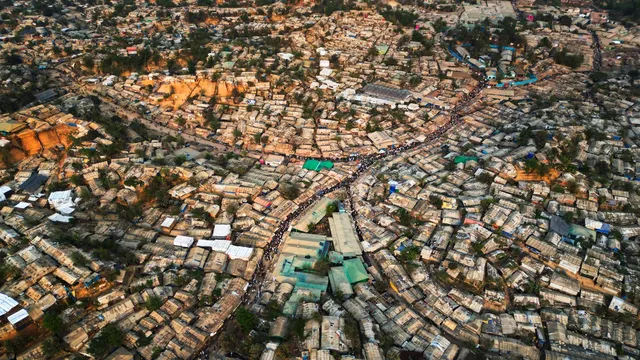
UN cuts food rations as Rohingya refugees face dire conditions
2025-03-21 04:24- The U.N. World Food Program may reduce food rations for Rohingya refugees from $12.50 to $6 per month.
- A significant portion of funding for these refugees comes from the U.S., which is now facing cuts that could adversely impact their aid.
- Aid workers warn that these funding cuts will lead to severe consequences for the refugees, particularly for women and children.
Express your sentiment!
Insights
In Bangladesh, more than 1 million Rohingya refugees are currently living in dire conditions, especially in the sprawling camps of Cox's Bazar. This situation has deteriorated further with the looming cuts to humanitarian aid after U.S. President Donald Trump ordered a freeze on American foreign aid funding. The U.N. World Food Program has warned that if additional funds are not raised, food rations will be slashed from $12.50 a month to only $6, a change that will severely affect the refugees' ability to survive. This announcement has sparked panic among the camps, which host families that are already struggling to meet their basic needs, relying entirely on aid as they are not permitted to work in this host country. Rohingya refugees, who fled violent military crackdowns in Myanmar, included families that have endured significant hardship since 2017. The reduction in rations means that food security for these families is at risk, with many expressing that without proper sustenance, they fear for their lives. The effects of such cuts could also lead to increased crime and desperation in the camps, as residents may resort to theft or other extreme measures to provide for themselves and their families. Many refugees voiced concerns about the potential rise in violence and crime, particularly affecting the safety of women and children during these times of austerity. Aid workers have expressed urgency in addressing these funding gaps, highlighting the immediate need for continued support from the international community. They emphasize that any significant reduction in aid can lead to catastrophic consequences not only for food scarcity but also for medical needs, as families struggle to afford treatments for illnesses that are prevalent in the camps. With many families already living on the edge, the reduction in food rations would only exacerbate the desperate situation that these vulnerable populations are facing. U.N. Secretary-General António Guterres classified the cuts as a crime against those in desperate need, urging for renewed support to ensure the basic rights and needs of Rohingya refugees are met and preserved. It is crucial to maintain humanitarian assistance to prevent widespread suffering and potential unrest in an already volatile situation.
Contexts
The impact of U.S. foreign aid cuts on humanitarian assistance is a pressing issue that requires examination due to its potential effects on global welfare and stability. Over the years, U.S. foreign aid has played a critical role in alleviating suffering in various parts of the world, particularly in regions facing humanitarian crises such as famine, conflict, and natural disasters. Cuts to this funding can severely limit the ability of organizations to provide necessary services and support to vulnerable populations. As the world grapples with increasing challenges, from climate change to political instability, the reduction of U.S. aid could exacerbate existing issues, leading to a rise in poverty and humanitarian need. The ripple effects of such aid cuts can extend beyond immediate humanitarian consequences, influencing migration patterns, social unrest, and regional stability. In recent years, various reports and studies have suggested that the U.S. remains one of the largest donors of humanitarian assistance globally. However, budget cuts can lead to a significant decline in resources allocated for international aid. Organizations such as the United Nations and non-governmental organizations (NGOs) rely heavily on U.S. funding for their operations. As these organizations scale back their programming in response to funding challenges, the most vulnerable populations may experience diminished access to food, healthcare, shelter, and education. These reductions can create a cycle of impoverishment and insecurity that further complicates the humanitarian landscape. The potential implications of U.S. foreign aid cuts extend to global health initiatives as well. Support for vaccination campaigns, treatment for infectious diseases, and maternal and child health programs may suffer, hindering progress that has been made over the years. For example, substantial investments have been made in combating diseases like HIV/AIDS and malaria, which could be jeopardized by a decrease in foreign aid. This not only affects the individuals directly involved but can also lead to health crises that may have a lasting impact on economic development and productivity in affected regions. Ultimately, while the U.S. government may pursue foreign aid cuts as a means of fiscal austerity, the long-term societal costs could be profound. Humanitarian assistance is not merely a charitable act; it contributes to global stability and peace. Therefore, it is critical for policymakers to weigh the immediate financial benefits of aid reductions against the potential long-term consequences for humanitarian support globally. Allocating adequate resources for foreign aid, even amidst budget constraints, is essential to safeguard the well-being of millions and promote international cooperation.